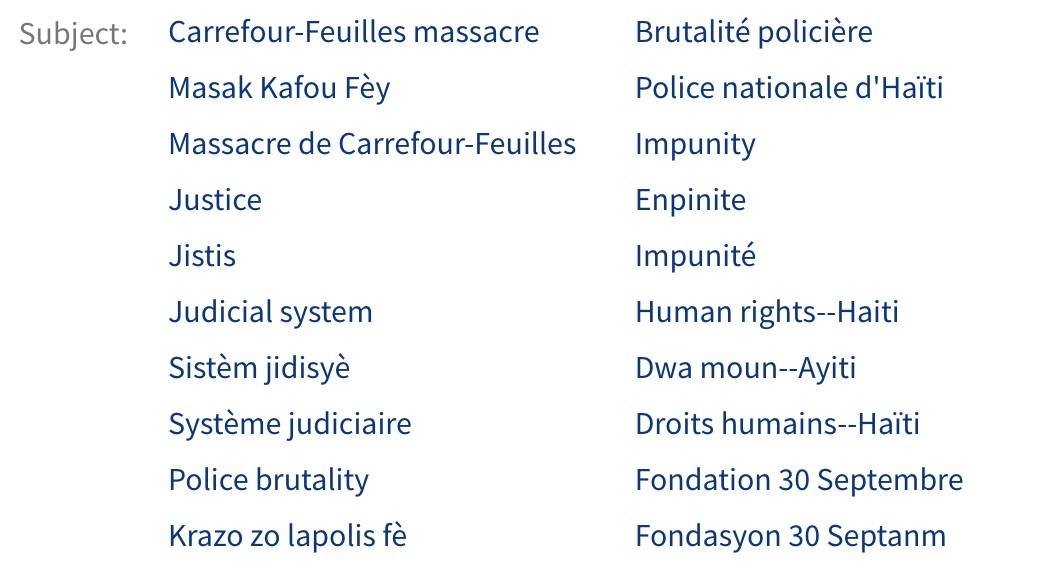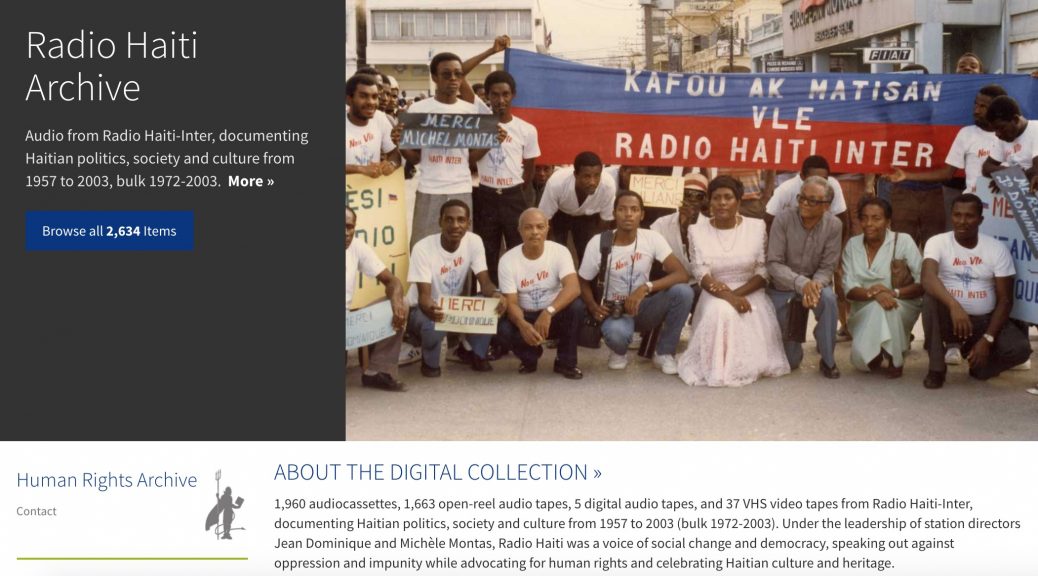Post contributed by Maggie Dickson, Metadata Architect, Digital Collections and Curation Services
As the metadata architect in the Digital Collections and Curation Services Department at Duke University Libraries, I have the opportunity to work on the design and development of many fabulous digital collections. This includes the Radio Haiti Archive, which has been one of the most interesting—and challenging—projects I’ve worked on throughout my 10+ years of working with digital collections.
Over the past few years, we’ve been standardizing our metadata practices across digital collections so that they will be more scalable and sustainable—we’ve learned the hard way that the more specialized a collection is, the more prone it is to breakages and difficulties over time. The Radio Haiti project needs are really specialized, and the metadata (description) is rich, granular, and multilingual. So, striking the right balance between standardization and specialization is definitely a challenge.
One of the foundational goals of the NEH grant we received for our work with Radio Haiti is to make sure that the collection is accessible to people in Haiti as well as the Haitian diaspora, and therefore we needed to provide description in three languages: English, Haitian Creole, and French. While we’d worked with metadata in multiple languages before, we’d never worked with trilingual content, and the technology we use to present and manage our digital collections doesn’t accommodate multilingual metadata in a sophisticated way. To get around this, rather than create lots of custom metadata fields just for this collection, we decided to use our standard fields, such as title, description, and subject, to store the multilingual content. The metadata displays in the item record and is keyword searchable and, in the case of subjects and formats, faceted. This isn’t the most elegant solution, but it works, and when the digital library community develops support for multilingual content, we will be ready!

Beyond figuring out how to present the metadata to users of the archive, it has also been an ongoing challenge to figure out how to manage the workflow for the development of the metadata—not only is it complex, it is voluminous! Created iteratively by project archivist Laura Wagner and her team of intrepid translators, the metadata passes through several hands and undergoes quite a few transformations before it is ready to go live on the website. Therefore, it has been critically important that we continuously review and revise our process to make sure nothing gets lost or distorted along the way. So many spreadsheets!

Through much careful consideration and many meetings with project staff, I think we’ve achieved a good balance between meeting project needs and being responsible to the long-term health and sustainability of this and other digital collections. That being said, we still recognize the inherent limitations to providing broad accessibility to this important content—despite the inclusion of multilingual metadata in the digital collection, it is still embedded in a predominantly English language website for an academic research institution located in the United States. And as project archivist Laura Wagner stated in an earlier blog post, “Radio Haiti’s digital archive is not only for scholars writing about Haiti; it isn’t even principally for them. It is for everyone.”
We’re experimenting with a few options to try to address this limitation, including engaging in ‘digital repatriation’ by distributing flash drives loaded with content to cultural heritage organizations in Haiti, standing up pilot collections of the content to reach a broader audience using YouTube and the Internet Archive, and improving the performance of the digital collection in low-bandwidth environments.
Working on the Radio Haiti Archive has been a challenge both in technological ways as well as how we think about collections, collecting, and access. Providing broad, equitable access to our digital collections, through our use of metadata and otherwise, is an intense and critical challenge, but one which we are beginning to tackle with intentionality and enthusiasm.
The processing of the Radio Haiti Archive and the Radio Haiti Archive digital collection were made possible through grants from the National Endowment for the Humanities.


